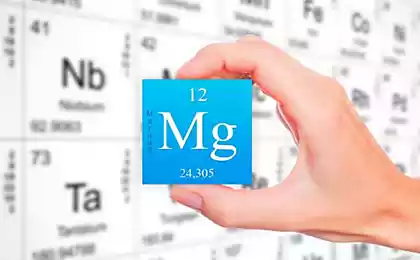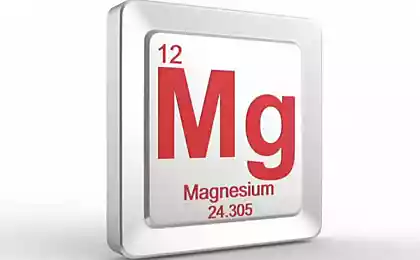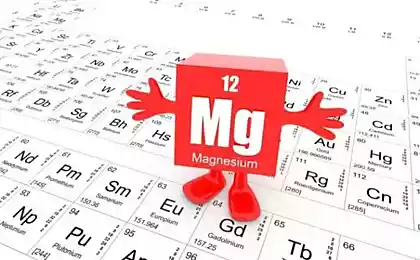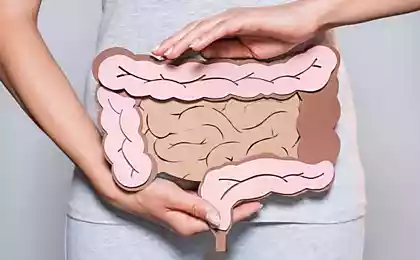246
Magnesium: properties and role of the human body
Magnesium - the mineral of life Magnesium is one of the most valuable elements not only for the human body, but for all life on Earth.
No wonder the name of this metal comes from the French "Magnifique", which translates as "magnificent". Magnesium atoms are the basis of all life, they are the basic element in the molecules of green plants. For the human body, magnesium is a structural element. This means that the element must be contained in sufficient quantities in the bones of the skeleton, in the muscles, in the glands of internal secretion, in the blood. And with a lack of magnesium, the quality work of all these body systems is simply impossible.
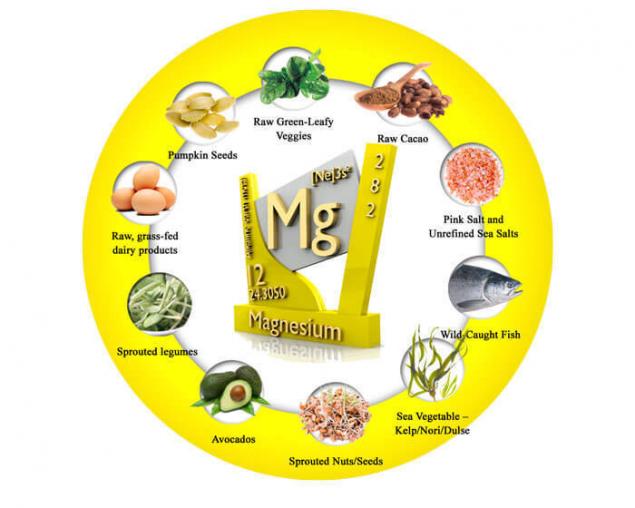
Magnesium is involved in more than 300 biochemical processes in the body. An imbalance of magnesium immediately causes a disorder in the work of various body systems. Signs of magnesium deficiency are tension and muscle spasms, hand tremors, pain in the heart and accelerated heartbeat, constipation, irritability, insomnia, dizziness, fatigue and weakness, loss of appetite and a number of other ailments.
Since magnesium is closely connected in the body with other elements, its lack will provoke their imbalance. For example, potassium is not retained in cells unless it binds to magnesium. This can cause problems with the cardiovascular system. Due to the lack of magnesium, problems with bones, teeth, hair condition can occur.
As already mentioned, magnesium is initially contained in the body. So why is there a lack of this element? The fact is that magnesium is easily excreted from the body with the wrong lifestyle. Alcohol consumption, frequent stress, poor nutrition, fascination with black tea and coffee, increased sweating - all this increases the need for magnesium.
Magnesium intake per day is 400 mg for men and 310-320 mg for women. With stress, alcohol consumption, the body needs more magnesium.
How does magnesium work in the body?
An excess of magnesium is rare. Healthy kidneys remove excess magnesium quickly and efficiently.
The absorption of magnesium is also hampered by excess fats and calcium in food. published
Author: Nelly Petrova
P.S. And remember, just changing our consumption – together we change the world!
Join us on Facebook and VKontakte, and we are also in Odnoklasniki
Source: www.min10kg.ru/articles/health/magniy_mineral_zhizni_/
No wonder the name of this metal comes from the French "Magnifique", which translates as "magnificent". Magnesium atoms are the basis of all life, they are the basic element in the molecules of green plants. For the human body, magnesium is a structural element. This means that the element must be contained in sufficient quantities in the bones of the skeleton, in the muscles, in the glands of internal secretion, in the blood. And with a lack of magnesium, the quality work of all these body systems is simply impossible.

Magnesium is involved in more than 300 biochemical processes in the body. An imbalance of magnesium immediately causes a disorder in the work of various body systems. Signs of magnesium deficiency are tension and muscle spasms, hand tremors, pain in the heart and accelerated heartbeat, constipation, irritability, insomnia, dizziness, fatigue and weakness, loss of appetite and a number of other ailments.
Since magnesium is closely connected in the body with other elements, its lack will provoke their imbalance. For example, potassium is not retained in cells unless it binds to magnesium. This can cause problems with the cardiovascular system. Due to the lack of magnesium, problems with bones, teeth, hair condition can occur.
As already mentioned, magnesium is initially contained in the body. So why is there a lack of this element? The fact is that magnesium is easily excreted from the body with the wrong lifestyle. Alcohol consumption, frequent stress, poor nutrition, fascination with black tea and coffee, increased sweating - all this increases the need for magnesium.
Magnesium intake per day is 400 mg for men and 310-320 mg for women. With stress, alcohol consumption, the body needs more magnesium.
How does magnesium work in the body?
- It participates in the processes of energy formation in the cells of the body.
- Ensures the health of the nervous system. Experts say that magnesium provides balance and rest in the body. The mineral also affects the production of the joy hormone serotonin. Therefore, with a normal magnesium content in the body, there are no problems with sleep, the mood becomes even. Both emotional and physical problems associated with tension and anxiety go away.
- Magnesium is involved in the digestive process. Rarely does anyone associate a lack of magnesium with such a problem as constipation. And, nevertheless, it is magnesium that provides motor activity of the intestine. Magnesium ions are found in both saliva and gastric juice, so the mineral is necessary for good digestion of food. Magnesium stimulates bile extraction.
- Magnesium works in the kidneys. A normal amount of the mineral is necessary to prevent urolithiasis.
- Magnesium is necessary for the normal functioning of the heart and blood vessels, in conjunction with potassium. In addition, magnesium is a kind of electrolyte, contributes to the balance of fluids, and in this regard normalizes blood pressure.
- Magnesium is a beauty mineral. Its presence will help improve the condition of teeth, hair and nails.
- Magnesium is essential for diabetes prevention, as it promotes better insulin release.
- In pregnancy, a normal amount of magnesium saves from the tone of the muscles of the uterus, and therefore prevents miscarriages. Women need magnesium for hormonal balance, then you can avoid unpleasant sensations with PMS.
- Magnesium is also involved in ensuring healthy immunity.
An excess of magnesium is rare. Healthy kidneys remove excess magnesium quickly and efficiently.
The absorption of magnesium is also hampered by excess fats and calcium in food. published
Author: Nelly Petrova
P.S. And remember, just changing our consumption – together we change the world!
Join us on Facebook and VKontakte, and we are also in Odnoklasniki
Source: www.min10kg.ru/articles/health/magniy_mineral_zhizni_/
Whether to learn for robotics: 7 actual occupations of the industry
Darlingtonia: Lily-Cobra from California















